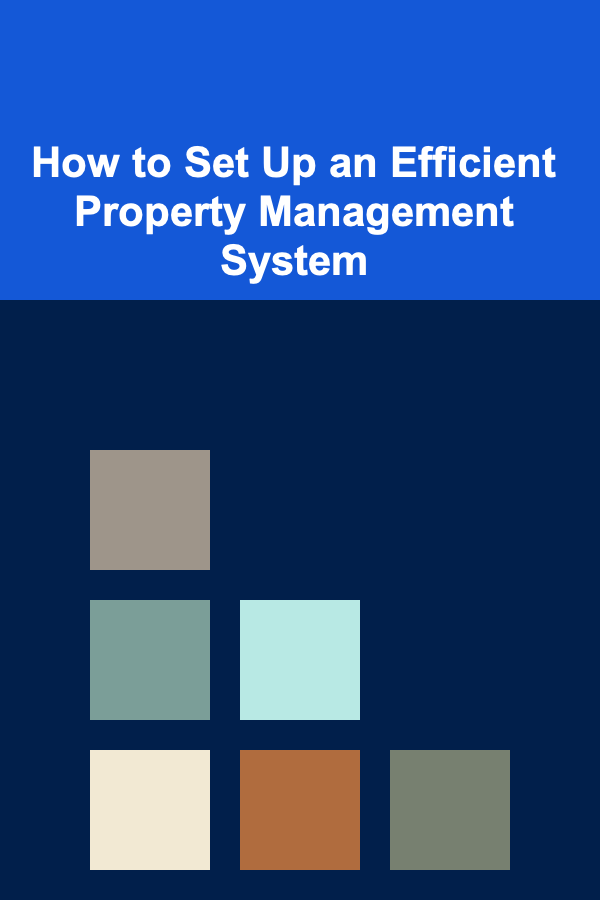
How to Set Up an Efficient Property Management System
ebook include PDF & Audio bundle (Micro Guide)
$12.99$11.99
Limited Time Offer! Order within the next:

Effective property management is crucial for ensuring the smooth operation of rental properties and maximizing returns. Whether you are managing a single rental unit or an extensive portfolio of properties, having a robust and efficient property management system in place is essential for long-term success. A well-organized system not only helps to maintain the property but also allows for streamlined tenant communication, financial tracking, and operational management. In this article, we will discuss the various components required to set up an efficient property management system, along with practical tips and tools that can help you optimize your operations.
Understanding Property Management
Property management involves overseeing the day-to-day operations of a property, including maintaining the physical condition of the building, managing tenants, handling finances, and complying with legal requirements. A comprehensive property management system should integrate all aspects of this work and provide a clear framework for managing properties effectively.
Key Aspects of Property Management:
- Tenant Management: Screening, leasing, communication, and addressing tenant issues.
- Maintenance and Repairs: Routine inspections, repairs, and maintenance requests.
- Financial Management: Rent collection, budgeting, and accounting.
- Legal Compliance: Ensuring compliance with local laws, regulations, and lease agreements.
- Marketing and Vacancy Management: Advertising properties, conducting showings, and handling leasing.
Establishing Clear Goals and Objectives
Before implementing a property management system, it's essential to define your goals and objectives. What are you hoping to achieve with your system? Are you aiming for better tenant retention, more efficient maintenance processes, or a streamlined accounting system? Clear goals will guide your decision-making process and help you assess the success of the system once it's up and running.
Common Goals for Property Management:
- Maximizing Occupancy Rates: Minimize vacancies and ensure properties are rented quickly.
- Optimizing Cash Flow: Ensure timely rent collection and reduce operational costs.
- Enhancing Tenant Satisfaction: Foster a positive relationship with tenants to promote renewals.
- Ensuring Legal Compliance: Stay compliant with all relevant laws and regulations.
- Improving Maintenance Efficiency: Reduce response times for repairs and maintenance requests.
Selecting the Right Property Management Tools
An effective property management system should incorporate tools that make managing day-to-day operations easier. These tools should automate and streamline routine tasks such as rent collection, maintenance tracking, financial management, and tenant communications.
Software Solutions
Property management software can greatly enhance efficiency by centralizing important data and automating tasks. Here are some types of software you might want to consider:
- Property Management Platforms: These all-in-one systems allow you to manage leases, track payments, and communicate with tenants. Examples include AppFolio, Buildium, and Rentec Direct.
- Accounting and Financial Tools: Proper accounting is essential for tracking revenue and expenses. QuickBooks, Xero, and FreshBooks can help you track income and expenses and generate financial reports.
- Maintenance Management Software: Tools like Maintenance Care, HappyCo, and Property Meld allow tenants to submit maintenance requests, track issues, and schedule repairs efficiently.
- Tenant Screening Services: Companies like TransUnion, TenantCloud, and RentPrep provide tenant screening services, helping you evaluate potential tenants for creditworthiness, rental history, and criminal background.
Cloud-Based vs. On-Site Software
Cloud-based property management software allows you to access information from anywhere, which is especially useful for remote management of multiple properties. On-site software may be suitable for smaller operations but may lack the flexibility and scalability of cloud-based options.
Tenant Screening and Lease Agreements
Proper tenant screening is a critical component of a successful property management system. An efficient tenant screening process ensures that you select responsible, reliable tenants who will pay rent on time, follow the lease terms, and take care of your property.
Tenant Screening Process
A comprehensive screening process typically includes the following steps:
- Application Form: Have prospective tenants fill out an application form that includes personal information, rental history, and employment details.
- Background Check: Conduct a thorough background check to verify the applicant's criminal history, eviction record, and credit score.
- Reference Check: Contact previous landlords and employers to gather additional insights into the tenant's behavior, reliability, and work habits.
- Interview: Meeting with the tenant in person or over video call helps establish rapport and ensure the applicant is a good fit for your property.
Lease Agreements
A well-crafted lease agreement should clearly outline the terms and conditions of the rental, including rent payment dates, maintenance responsibilities, and the duration of the lease. Using a lease template or working with an attorney to draft a legal agreement will help you ensure that the lease is legally binding and compliant with local regulations.
Key Elements of a Lease Agreement:
- Rent amount and payment terms
- Security deposit requirements
- Maintenance responsibilities
- Rules on pets, smoking, and noise
- Late fees and penalties
- Termination clauses and procedures
Rent Collection and Financial Management
A core part of any property management system is handling finances. Rent collection is typically the primary source of revenue for rental properties, and effective financial management ensures that you can keep track of income and expenses, set aside money for taxes, and budget for future repairs.
Rent Collection
To streamline rent collection, you can offer several convenient payment options for tenants, including:
- Online Payments: Utilize online payment platforms like Rentec Direct, PayPal, or Venmo to allow tenants to pay rent digitally. This ensures timely payments and reduces the risk of late fees.
- Bank Transfers: You can also set up a dedicated bank account for rent payments and provide tenants with banking details for direct transfers.
- Checks or Money Orders: If tenants prefer traditional payment methods, ensure you have a system in place to process and record checks and money orders.
Financial Reporting and Budgeting
Regular financial reporting is essential to monitor the health of your property portfolio. You should keep track of:
- Income and Expenses: Record rent payments, late fees, repair costs, property management fees, insurance premiums, and other relevant expenses.
- Cash Flow: Regularly assess your income against your expenses to ensure you're maintaining a positive cash flow.
- Tax Preparation: Keep track of all expenses related to your property, such as repairs and maintenance, as these can be tax-deductible.
- Budgeting: Set aside funds for ongoing maintenance, property upgrades, and emergency repairs.
Property management software often includes built-in financial reporting features, but you can also use external accounting software like QuickBooks to integrate your financial data.
Maintenance and Repair Management
An efficient property management system ensures that maintenance requests are handled promptly and efficiently. Keeping tenants satisfied with quick repairs and well-maintained properties reduces turnover rates and improves tenant retention.
Maintenance Request System
An online platform or a dedicated phone line for tenants to submit maintenance requests ensures that issues are addressed in a timely manner. This system should allow tenants to submit detailed descriptions of their problems, including photos if possible, and enable you to track the status of each request.
Maintenance management software can help you:
- Schedule repairs and track progress.
- Monitor which issues are recurring and prioritize them.
- Communicate with tenants about when repairs will take place.
Preventive Maintenance
In addition to responding to maintenance requests, it's essential to schedule regular preventive maintenance to avoid larger, more expensive issues in the future. Preventive tasks can include:
- Inspecting plumbing systems to prevent leaks.
- Servicing HVAC units to ensure proper function.
- Replacing worn-out appliances or electrical components.
- Checking for signs of pests and treating accordingly.
By staying on top of preventive maintenance, you can extend the lifespan of your property and reduce the frequency of emergency repairs.
Communication and Tenant Relations
Effective communication is a cornerstone of property management. Open and transparent communication helps build trust with tenants, ensuring they feel heard and valued. A successful communication system should facilitate quick responses to inquiries, maintenance requests, and rent issues.
Communication Tools
- Email and SMS: Use email for formal notices and important updates, and SMS for more immediate communication.
- Online Portals: A tenant portal integrated with your property management system allows tenants to access their payment history, submit maintenance requests, and receive important updates.
- Surveys and Feedback: Regularly survey tenants about their experience to identify potential areas for improvement and address any concerns.
Conflict Resolution
Despite your best efforts, conflicts may arise with tenants. Whether it's a dispute over late fees, property damage, or noise complaints, it's essential to address issues professionally and efficiently. Maintaining a calm and respectful demeanor will help prevent situations from escalating and promote positive outcomes for both parties.
Legal Compliance and Documentation
A crucial part of setting up a property management system is ensuring that you stay compliant with all applicable laws and regulations. This includes federal, state, and local laws related to tenancy, safety, and property maintenance.
Key Legal Considerations:
- Fair Housing Laws: Ensure your leasing process and tenant selection criteria comply with the Fair Housing Act, which prohibits discrimination based on race, color, religion, sex, familial status, national origin, or disability.
- Security Deposit Regulations: Many states have specific rules regarding security deposits, such as maximum amounts, deposit return timelines, and allowable deductions.
- Eviction Laws: Be familiar with the eviction process in your jurisdiction, including the legal requirements for notifying tenants and the steps involved in eviction proceedings.
Your property management system should include an organized system for storing and accessing important legal documents, such as leases, inspection reports, tenant communication, and payment records.
Marketing and Vacancy Management
In addition to tenant retention, a key part of property management is ensuring your properties are rented quickly when vacancies occur. A comprehensive marketing plan should include both online and offline strategies to reach potential tenants.
Advertising Strategies:
- Online Listings: Use platforms such as Zillow, Craigslist, Apartments.com, or local real estate websites to advertise available units.
- Social Media: Promote your properties on social media channels, including Facebook and Instagram, to reach a broader audience.
- Referral Programs: Encourage current tenants to refer friends or family members by offering incentives such as a rent discount.
Showing Properties
When vacancies occur, having an efficient system for scheduling and conducting property showings is essential. Property management software often includes a feature to automate this process, allowing you to set up showings, confirm appointments, and collect feedback from potential tenants.
Conclusion
Setting up an efficient property management system requires a combination of strategic planning, the right tools, and ongoing attention to detail. By implementing a comprehensive system that covers tenant screening, financial management, maintenance tracking, communication, legal compliance, and marketing, you can ensure that your properties are well-maintained, tenants are satisfied, and your business runs smoothly. With the right processes in place, you'll not only reduce your workload but also increase profitability and enhance tenant retention. Effective property management is key to long-term success, so invest time and resources into building a system that supports your goals and helps you scale your property portfolio efficiently.
Reading More From Our Other Websites
- [Home Holiday Decoration 101] How to Make a Holiday Garland for Your Staircase
- [Personal Financial Planning 101] How to Pay Off Debt: Strategies to Get Out of the Red
- [Home Pet Care 101] How to Train Your Dog to Stop Barking at the Doorbell and Other Common Triggers
- [Home Security 101] How to Spot Vulnerabilities in Your Home Security Setup
- [Sewing Tip 101] The Upcycling Project: Transform Old Clothes into Chic New Pieces
- [Home Lighting 101] How to Make Your Home Feel Larger with the Right Lighting
- [Ziplining Tip 101] Team-Building on the Treetops: Using Ziplining to Strengthen Group Dynamics
- [Personal Investment 101] How to Choose Between Stocks and Bonds for Your Portfolio
- [Hiking with Kids Tip 101] The Ultimate Guide to Choosing Safe and Comfortable Hiking Shoes for Kids
- [Organization Tip 101] How to Use Checklists for File Management Tasks

How to Clean Your Floors Without Damaging the Surface
Read More
How to Ensure Your One-Page Website Is Accessible to All Users
Read More
How to Set Up a Financial Cushion for Your Retirement Years
Read More
How to Deal with Language Learning Burnout
Read More
How to Live an Extraordinary Life
Read More
How to Get Cheap Cruise Deals: A Comprehensive Guide
Read MoreOther Products

How to Clean Your Floors Without Damaging the Surface
Read More
How to Ensure Your One-Page Website Is Accessible to All Users
Read More
How to Set Up a Financial Cushion for Your Retirement Years
Read More
How to Deal with Language Learning Burnout
Read More
How to Live an Extraordinary Life
Read More